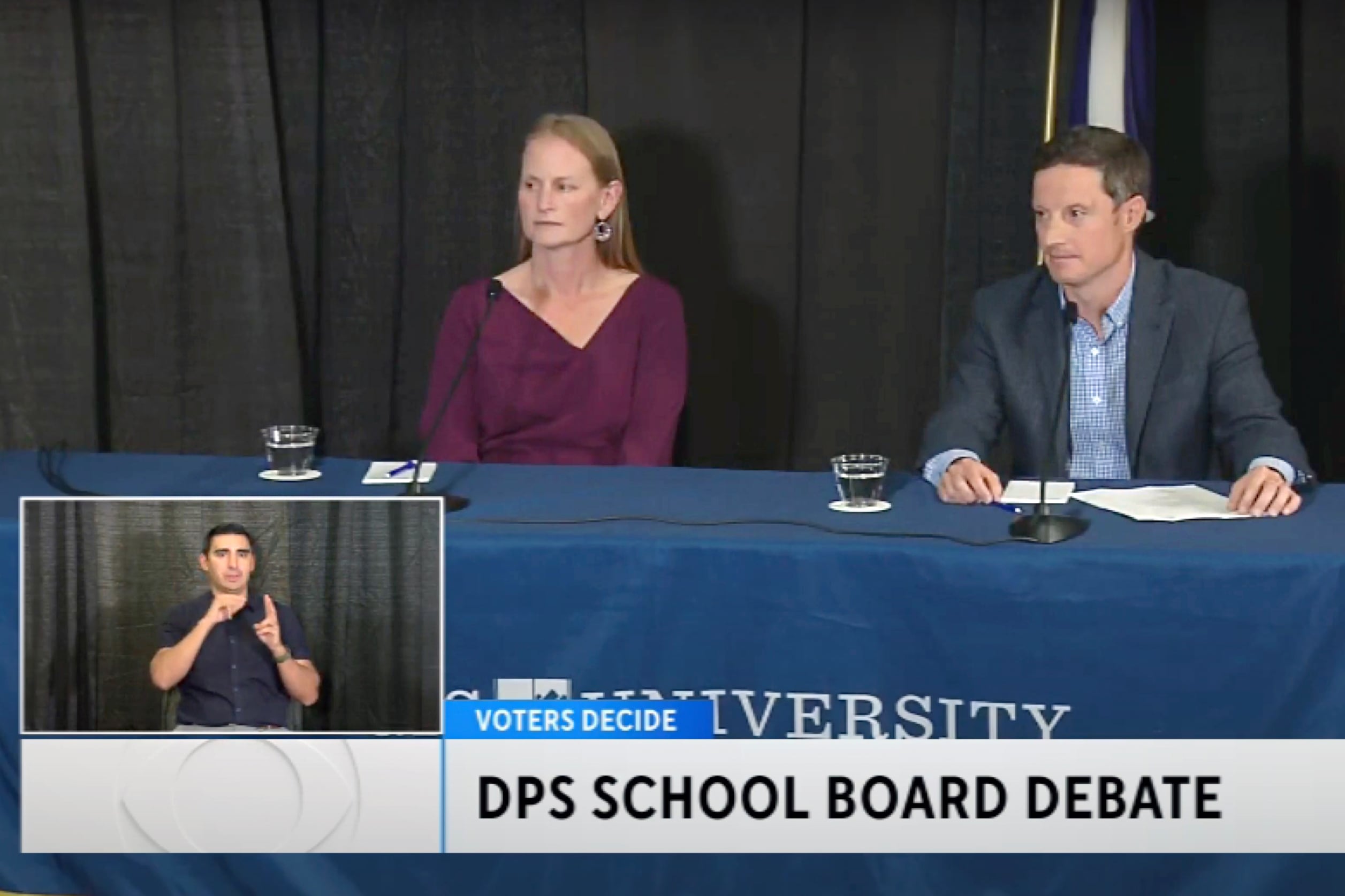Denver school board candidates Scott Baldermann and Kimberlee Sia shared the stage at a recent debate, where they disagreed about school autonomy and teacher rights, the leasing of an empty school building to the Archdiocese of Denver, and whether the school board is dysfunctional.
Baldermann is a current school board member and Denver Public Schools parent who is running for re-election to represent southeast Denver’s District 1. Sia is also a DPS parent and the former CEO of the KIPP Colorado charter school network.
The debate, which took place last week at Regis University, was co-sponsored by Chalkbeat Colorado, CBS Colorado, Regis, and Educate Denver.
Three of the seven Denver school board seats are up for grabs Nov. 7. The election has the potential to shift the dynamics of the board, which has been criticized for infighting. It will also shape the district’s approach to school safety, declining enrollment, and other challenges.
Below, read some of what Baldermann and Sia had to say at the debate and watch the full 30-minute video. The candidates’ responses have been edited for length and clarity.
Kimberlee, is there a vote that Scott took as a sitting board member that you disagreed with? And Scott, is there a position of Kimberlee’s that you disagree with?
Sia: There are actually two that I would comment on. The first is … the proposal of the policy that limited the flexibilities that our innovation schools had. [Editor’s note: Innovation schools are semi-autonomous district-run schools that can waive certain district rules and parts of the teachers union contract. The board voted to limit those waivers.]
Many of our innovation schools have sat with community and with teachers and with families and students and been really thoughtful about the [innovation] plans that they have created. Teachers have to vote on those plans and to put those waivers into place. In discussing how [the board’s vote] is to help protect teachers’ rights, I think that that actually diminishes the innovations that teachers themselves had voted on.
The second vote that I did not agree with that Scott made was to lease the Rosedale property of the school district to the Archdiocese [of Denver] during a time when the district had declining enrollment.
And you’ve now created a school that can recruit students from the district. And additionally, they are now suing the state because they’re not receiving funds from UPK. [Editor’s note: UPK is is the state’s universal preschool program. The Archdiocese is suing for the right to exclude LGBTQ families from its preschools].
Baldermann: Kimberlee and I have done many debates over the last few weeks, and I’ve been surprised that we agree on a lot of things when it comes to values and on equity.
Where you’ll see us go in different directions is when it comes to teacher rights, when it comes to governance models. The vote that she’s referring to is Executive Limitation 12.10. That is something that I drafted. It prevents our innovation schools from waiving statutory collective bargaining rights of our teachers. It was supported by a large majority of our teachers. I support innovation schools. I don’t support certain waivers, especially when it’s around teacher rights.
If I can use my rebuttal on Rosedale? When we were looking at all the available options for Rosedale, there was a discussion around, ‘Will Rosedale be pulling kids that would have otherwise gone to a DPS high school?’
And our facilities team and the portfolio office felt that that was not going to happen because the students that would have attended the Archdiocese already most likely would have either gone to Regis [Jesuit High School] or to Mullen [High School, both of which are private religious schools]. And so there was no risk of really losing any students because … they never would have attended a DPS school.
Sia: At that time, that might have been the information that you all had received. And I would also say that the number of families I have spoken to, particularly coming into this school year, who have now made those choices to go to a religious school or private school because they are so dissatisfied with what’s happening in DPS, actually makes me wonder if the numbers are much higher than were projected at that time.
Denver gained national attention for its “family of schools,” which includes traditional district-run schools, semi-autonomous innovation schools. and independent public charter schools. This current board has been less inclined to champion charters, and has limited innovation. What is your opinion on strengthening traditional schools versus reimagining them as innovation or charter schools?
Baldermann: I want to be very clear that I want our innovation schools and our charter schools to be successful. I mean, why wouldn’t we?
Where I get concerned is around the charter and innovation zone — very different from innovation schools — … model because it is shifting accountability to boards that are ultimately not elected by the people and ultimately not accountable to all of us.
In my first term, nine charter schools closed. One of them, I got a 24-hour notice, which is very surprising. Each one of those schools served high populations of vulnerable students. I think it is too risky for us to continue down the path where we have alternate governance models that function more as businesses that close [schools] as if they are a business. It’s just too risky.
Sia: I believe that we should strengthen all of our schools. I think we have such a unique opportunity in Denver for our families to attend different types of schools. My own children have attended traditional DPS schools, have attended charter schools, have attended a BOCES with Rocky Mountain School of Expeditionary Learning.
What we should do is provide supports to all of our schools that ensure that they are the best that they can be, that we are holding all of our schools to the same levels of accountability, and that we are working with the teachers, families, students at those schools to figure out, ‘How can we collaborate and learn from each other?’
I, as a parent, have kids at two different types of schools. I know those schools could learn from each other if they were … collaborating with each other.
The school board has been criticized as dysfunctional, and polls have shown low confidence in its ability to govern. What changes would you propose to how the board does business?
Sia: The first change that I would propose is that the board has a singular focus, and they understand that that focus is our kids. And that when we are coming together as a board, the decisions that are being made are being made in the best interest of students. And we’re not letting individual interests govern the decisions that we’re making.
The second item that I would really like to see for us as a board is to think about our role in rebuilding trust with our community. Folks are so frustrated with seeing the board in the newspaper, seeing the infighting that has been happening on the board. And I think if we want our teachers and our families and our students to believe that we are doing what is right and best for them, we as a board have to take the responsibility for that.
Baldermann: I would actually not describe the board as dysfunctional. What we are seeing — and I’m just as frustrated with this as everybody else — is interpersonal dynamics that are overshadowing a lot of the good work that the board has done.
We’ve implemented a whole new policy governance framework. And we’ve made great progress on making sure that our values are reflected in our … policies.
If I was truly a dysfunctional board member, I wouldn’t be the only board member that has currently elected public officials that have endorsed me. I’ve been [endorsed] by Councilman Paul Kashmann, Rep. Emily Sirota, Rep. Steven Woodrow, Rep. Meg Froelich — all elected officials that currently overlap with District 1. I think that says a lot. They would not put their name behind me if I was unprofessional and I’ve not been keeping my head down and focusing on what is important, and that is our policy work to improve student outcomes.
Watch the entire debate below or see it here.
Melanie Asmar is a senior reporter for Chalkbeat Colorado, covering Denver Public Schools. Contact Melanie at masmar@chalkbeat.org.








